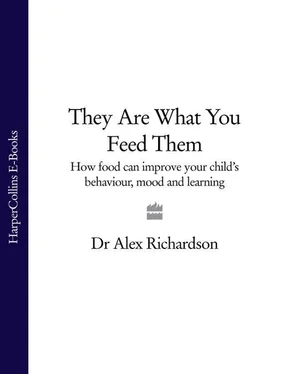It’s rather ironic that veterinary training involves far more emphasis on nutrition and health than does ordinary medicine—probably because the economic factors surrounding animal health are rather different. When farm animals get sick, for example, dietary considerations and possible nutrient deficiencies or imbalances are usually one of the main factors considered. That said, vets’ patients don’t usually attend their appointments demanding a course of pills that will make them better! We would do well to learn from this.
What other specialists might you and your child see? Clinical psychologists, occupational therapists, education professionals, and those working in social services or related fields receive little or no formal training in how food and diet can affect behaviour and mental health. For this reason these professionals can often be very sceptical about dietary issues, even when parents try to raise these.
Good nutrition is the essential foundation for health—and poor nutrition is guaranteed to lead to ill-health of one kind or another, sooner or later. This is as true for the brain as it is for the body. Unhealthy children generally do not feel well, do not behave well, do not learn well, and—surprise, surprise—do not perform well.
The same goes for unhealthy parents, so I do want to emphasize that this book is written for you, not just for your child. It also applies, of course, to unhealthy teachers, unhealthy doctors, unhealthy social workers or any other unhealthy people whose opinions and decisions are important to your child’s welfare! You may already have met some of these.
You may want to look at what the statistics say about health, life expectancy and job satisfaction among members of our education, health, social service and criminal justice systems. Most of the sad facts are easily explicable in terms of the conditions and the culture in which these professionals are expected to work, the ever-increasing targets they are supposed to meet, the training and resources with which they are provided, and the systems and people that govern them. Most of them know very little about nutrition, as I have pointed out already. Those that do are not usually encouraged (or even allowed) to use that knowledge in their work…
It’s Up to You to Take Charge
It’s easy to blame the health services, your child’s school, the social workers or other professionals for ignoring any dietary issues that you think are affecting your child. In the current climate, though, strict financial controls, superficial ‘efficiency’ criteria and short-term goals have come to dominate. These will obviously colour both the motives and the information available to managers and policy-makers in these areas. I share your frustration—but these are not things that most of us can hope to influence very easily, so there’s little point in dwelling on them for long here.
It’s your life, and your child’s life, that we are focusing on in this book.
You may already have adopted some dietary strategies with your child. If so, I hope you’ve already seen some benefits. You’ll also need some luck, though, because much of what you’ll have read or been told about the effects of food and diet on your child’s behaviour and performance is not actually supported by any reliable evidence—usually because the studies needed to provide this just haven’t been done. This is a real problem that I’ll do my best to help you with in this book. Mind you, the same is also true of a remarkable number of ‘interventions’ (treatments or management methods) that are part of ‘standard practice’ in medicine—not to mention the education, social services and criminal justice systems.
Some research into how food and diet may be affecting our behaviour is almost impossible to do—either because the ‘uncontrolled experiments’ have been going on for so long that there is no control group left, or because ethical issues make some types of studies difficult or impossible. For example, in the Western world we have all been consuming ‘trans fats’ for many decades now. (You can read more about these in Chapter 8.) These artificially twisted fats are found in hydrogenated vegetable oils (used in many cheap margarines, fried foods and commercially baked goods of all kinds), and are now known to damage our physical health. Given that the brain is 60 per cent fat, might these artificial fats alter its structure or function, too? Very probably…but it would be extremely hard now to find a well-matched control group who have not been ingesting trans fats for most or all of their lives. What’s more, extracting brain tissue from living subjects to study how its fat composition may relate to psychological well-being or performance is just not an option!
Similarly, a huge number of different food additives have been permitted following individual ‘safety testing’ for potential toxic effects. Do these tests look at how these food additives might act in combination? Well, no, actually—that would be far too complicated. With the number of additives now in use, it’s just not feasible. In fact, it is only very recently that some careful studies have looked into how the growth of nerve cells may be affected by just two common food additives in combination. Even though more work is still needed, the first results (discussed in Chapter 6) will give every parent cause for concern.
Show Caution and Take Practical Steps
Although the scientific studies needed to answer some important questions simply can’t be done, in my view we would often do well to follow the ‘precautionary principle’, especially when it comes to ingredients that are used purely for cosmetic appeal and the convenience and profits of the manufacturers (as is the case with many artificial flavourings and colourings, or hydrogenated fats).
My aim is to give you a new way of thinking about your child’s health and performance as a whole, and provide you with a better understanding of the issues surrounding food and diet, and how these can affect your child’s well-being.
I’ll be giving you some facts that may well be new to you, but I will also do my best to provide a framework that allows you to integrate any new information with what you already know. I’ll encourage you to start thinking about the information you get from other sources, so that you don’t find yourself confused by the apparently conflicting advice you hear or read about elsewhere. Overall, I urge you to gather what reliable and relevant information you can, weigh up the likely risks and costs against the potential benefits, and then make your own informed choices.
‘When I told my doctor I thought my son (then 7) was intolerant to cows’ milk, he sneered at me and prescribed some drugs. Because it was a short appointment, I held my tongue, but binned the prescription, switched my son to goats’ milk and cheese, and his symptoms improved dramatically. You know, apart from the doctor’s arrogant belief that his way was the only way, I think the fact I was dressed as a “mum at home” had a lot to do with his not listening to me properly! I find if I’m dressed smartly, I get listened to much more than if I’m wearing jeans and trainers.’— Sarah
Ask Questions All the Time
Of course, anything you read here will inevitably be coloured by my views, ideas, beliefs and prejudices, along with the knowledge and experience I’ve gained over the years that I want to share with you. At the end of the day, you are the only one who can decide what—among all the information you gather—can actually be trusted. If you’re not sure, keep asking questions:
Is this information really independent, or just another piece of advertising?
Читать дальше












